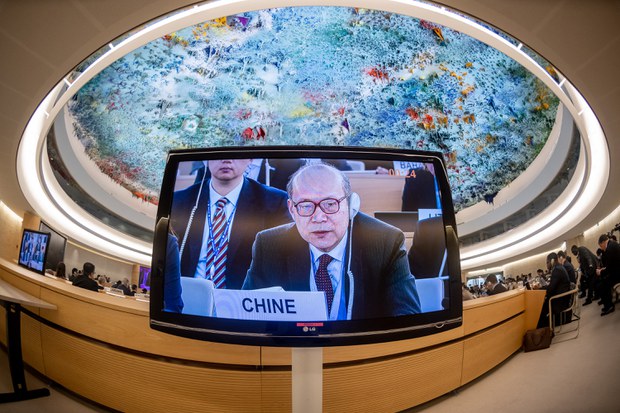Activists condemn The election of China to the UN Human Rights Council
Beijing is ‘unfit’ for membership, more than 80 groups representing Uyghurs, Tibetans, Hong Kongers say
Rights groups and overseas activists slammed China’s re-election to the United Nations Human Rights Council, saying Beijing is ‘demonstrably unfit’ to be a member because it actively seeks to undermine the protection of human rights.
China was among 15 members re-elected to the 47-member council, which was created in 2006, by secret ballot on Oct. 10, its second term on the council.
The result was immediately criticized by more than 80 organizations representing Tibetans, Uyghurs, Hong Kongers and other groups, including New York-based Human Rights Watch.
“China has utterly failed to meet [the] expectations for candidates, and has actively sought to undermine the promotion and protection of universal human rights around the world,” a statement published on the website of the World Uyghur Congress and signed by 88 groups around the world said.
China is “demonstrably unfit to hold a seat” on the council and has “has used its power and influence to attempt to silence the voice of civil society at the U.N.,” the statement said.
‘Patterns of intimidation’
The election came as U.N. human rights experts said they were “very troubled” about the mass trial of 47 democracy activists currently under way in Hong Kong, and expressed “grave concern” over the enforced separation of Uyghur children from their parents to attend Mandarin-language boarding schools.
“The UN Secretary-General has recognized China as engaging in ‘patterns of intimidation and reprisals’ against human rights defenders and remains one of the top perpetrators of reprisals globally,” the groups’ statement said, calling on the United Nations to leave a chair empty on the council instead.

Human Rights Watch said in an Oct. 5 statement that China is responsible for “crime against humanity,” including cultural and religious persecution, family separation, mass arbitrary arrests and detention, rape, torture, and enforced disappearances targeting Uyghurs in Xinjiang.
World Uyghur Congress President Dolkun Isa condemned China’s re-election.
“The election of China, an authoritarian regime that has been committing an ongoing and active genocide against the Uyghur people for the past seven years, not only violates the founding principles of the U.N., it also violates the U.N. Declaration of Human Rights,” he said, likening it to “a wolf caring for the sheep.”
“China should be removed from the U.N. Human Rights Council and even the Security Council in order to guarantee the human rights and security of all peoples, especially those who live under its brutal regime,” he said.
Tried to block discussion of Uyghur report
Human Rights Watch China Director Sophie Richardson said China’s presence on the council will also affect the way it functions, limiting its effectiveness.
“This is a government that worked very hard [last year] to defeat even a discussion about the office of the High Commissioner for Human Rights’ report on the Uyghur region,” Richardson said.
“We see the Chinese government trying to undermine existing international human rights law and norms in a way that would make the Human Rights Council a much less effective protector and defender of human rights,” she told Radio Free Asia in an interview on Oct. 5.
Benedict Rogers, who heads the London-based rights group Hong Kong Watch, agreed, citing Beijing’s regional influence.
“China has been the single largest supplier of financial support to both the regimes in Myanmar and North Korea,” Rogers said. “[It is] also the largest provider of arms and diplomatic and political cover.”

China’s deputy permanent representative to the United Nations, Dai Bing, hit back at criticism of his country’s rights record on Oct. 10, accusing the United States of “fabricated lies and malicious smears.”
“The Chinese side firmly opposes the fabricated lies and malicious smears of China by the U.S. representative,” Dai told the Human Rights Council.
“Everyone who is without prejudice … knows that people of all ethnic groups in China live together in harmony … and people from all walks of life in Hong Kong enjoy extensive rights and freedoms.”
Tibetan reaction
The Tibetan government-in-exile also believes Beijing shouldn’t be on the council.
“The Central Tibetan Administration does not consider China an appropriate member of [the council] on the grounds of the present situation in China and its abusive human rights record,” said CTA spokesperson Tenzin Lekshay.
Nyiwoe, a researcher at the Tibetan Center for Human Rights and Democracy said council members should fully respect the importance of human rights.
“China does not abide by these rules and is very selective in defending [certain] rights according to its will and ignoring those which are irrelevant to it, posing a threat to [human rights] norms,” Nyiwoe said.
“China is not at all suitable to become a member of the United Nations Human Rights Council.”
Richardson said China’s re-election happened in part because four governments ran for four empty seats on the council, making its victory uncontested.
“If there is an encouraging aspect to this outcome, it’s that once again China, the Chinese government, got the lowest number of votes for that group,” she said. “And that I think indicates that if other governments had run, the Chinese government might have lost.”













